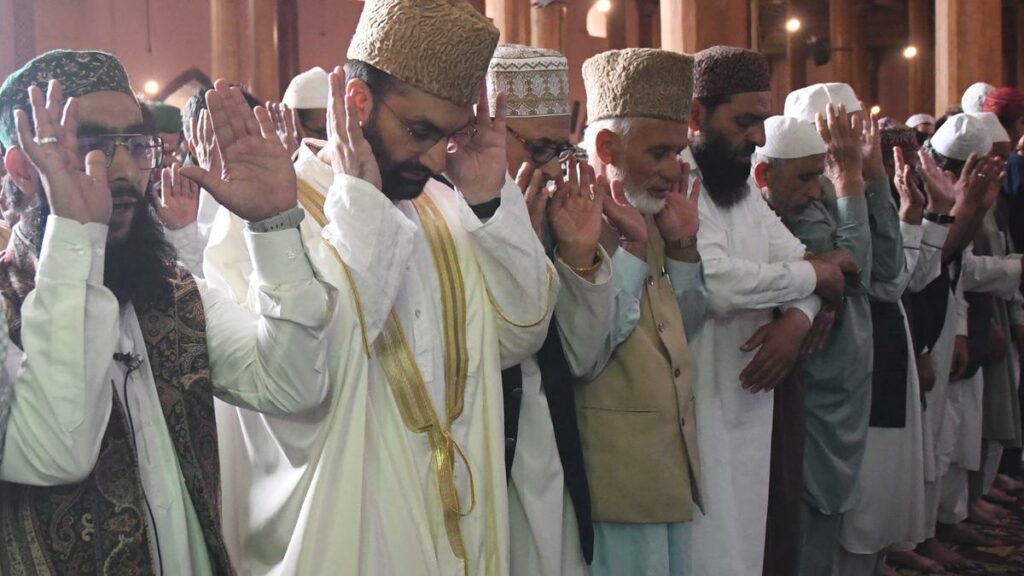Mirwaiz Umar Farooq’s release signals the ceding of space for separatist voices
“The Mirwaiz’s release reflects a change in the BJP’s approach to Kashmir. It is hard to put a finger on the right reason for his release — whether under external pressure or due to internal demands. However, in a first, senior BJP leader and Waqf Board chairperson Darakhshan Andrabi, who posted her picture with the Mirwaiz from a meeting held last year, took credit for the release. Earlier, Ms. Andrabi conspicuously visited the house of Jamiat Ahle-Hadith preacher Mushtaq Ahmad Bhat alias Mushtaq Veeri and made a phone call to Islamic preacher Moulana Abdul Rashid Dawoodi after they were released from jail. Both preachers were booked under the Public Safety Act (PSA) last year for “instigating youth in Kashmir”. On the contrary, Ms. Andrabi said these religious scholars were “very precious for the society.”
As Kashmir remains in a political flux, the picture will get clearer in the coming months as to whether the BJP has decided to see a lasting peace through the institution of dialogue or not.
After over four years of house detention, Mirwaiz Umar Farooq was released on September 22. The 50-year-old was allowed to deliver sermons at the historic Jamia Masjid in the volatile Nowhatta region in capital Srinagar. His release marks the first move by the Central government and the Jammu and Kashmir Lieutenant Governor since August 5, 2019 to concede space to separatist politics in Kashmir. Prior to that, separatist leaders called the shots in Kashmir through their agitational politics, much to the chagrin of New Delhi. Currently the chief cleric of the Kashmir valley, the Mirwaiz joined separatist politics at the age of 17, soon after his father Maulana Muhammad Farooq was assassinated by gunmen in 1990. More than 130 years old, the position of the Mirwaiz is rooted in distinct indigenous culture and has to do with preaching Islamic tenets with a thrust on accommodation and moderation while practicing the faith.
However, the Mirwaiz clan saw itself go up against the Hindu Dogra monarchy from Jammu in the 1930s and participated in an agitation to seek equal rights and fought for an end to the persecution of Muslims of Jammu and Kashmir. Eventually, the clan got drawn into identity-based politics. To date, it remains the hallmark of the Mirwaiz clan’s policy.
In fact, sidelining the Mirwaiz from political space since 2019 was part of the Bharatiya Janata Party (BJP)-led Centre’s larger policy to deny room to separatism in Kashmir. The Central government, in the run-up to the division of Jammu and Kashmir into two Union Territories and ending its special constitutional status in 2019, completely dislodged separatist politics from the political landscape. Top separatist leaders and their second-rung leadership were arrested in different cases. The crackdown extended to influential Islamic religious scholars too. It was followed by a vigorous exercise to sow the seeds for a new crop of leadership.
New ways
However, the Mirwaiz’s release reflects a change in the BJP’s approach to Kashmir. It is hard to put a finger on the right reason for his release — whether under external pressure or due to internal demands. However, in a first, senior BJP leader and Waqf Board chairperson Darakhshan Andrabi, who posted her picture with the Mirwaiz from a meeting held last year, took credit for the release. Earlier, Ms. Andrabi conspicuously visited the house of Jamiat Ahle-Hadith preacher Mushtaq Ahmad Bhat alias Mushtaq Veeri and made a phone call to Islamic preacher Moulana Abdul Rashid Dawoodi after they were released from jail. Both preachers were booked under the Public Safety Act (PSA) last year for “instigating youth in Kashmir”. On the contrary, Ms. Andrabi said these religious scholars were “very precious for the society”.
The BJP leader’s acknowledgement of these religious scholars is a departure from the past when they were projected as the party’s bete noire in Kashmir. It bears some resemblance to the approach adopted by the BJP-led National Democratic Alliance (NDA) in 2000. In the autumn of 1999, the entire Hurriyat leadership was arrested as the Lok Sabha polls were marred by boycott calls issued by the separatists. At 32.3%, Jammu and Kashmir recorded the lowest-ever participation in six Lok Sabha seats that year, with the Srinagar seat registering a mere 11.93% polling, to the embarrassment of New Delhi. In spite of the Kargil war in 1999, the NDA took bold steps to engage with the Hurriyat leadership in 2000. It culminated in direct talks between former Deputy Prime Minister L.K. Advani and Hurriyat leaders in January of 2004.
The Mirwaiz’s first-ever sermon in September this year saw a stark resemblance to the stand made by the Hurriyat before Mr. Advani in 2004, where the separatist amalgam advocated that “guns should be replaced by political talks”. In the latest statement, the Mirwaiz picked up threads from that stand and elaborated on the Hurriyat position to push for efforts to seek a resolution to the Kashmir issue “through an alternative to violent means, which is dialogue and reconciliation”. He, in fact, sought a fresh prism to look at the Hurriyat from being so-called separatists or peace disrupters to “realist resolution seekers”. As Kashmir remains in a political flux, the picture will get clearer in the coming months as to whether the BJP has decided to see a lasting peace through the institution of dialogue or not.
(The author is a journalist)
